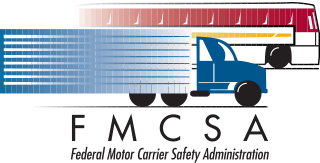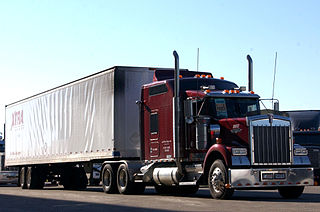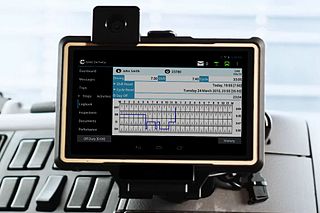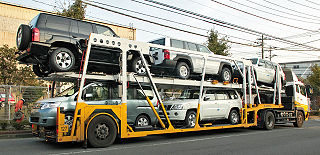
In transportation, freight refers to goods conveyed by land, water or air, while cargo refers specifically to freight when conveyed via water or air. In economics, freight refers to goods transported at a freight rate for commercial gain. The term cargo is also used in case of goods in the cold-chain, because the perishable inventory is always in transit towards a final end-use, even when it is held in cold storage or other similar climate-controlled facilities, including warehouses.
In finance, a surety, surety bond, or guaranty involves a promise by one party to assume responsibility for the debt obligation of a borrower if that borrower defaults. Usually, a surety bond or surety is a promise by a surety or guarantor to pay one party a certain amount if a second party fails to meet some obligation, such as fulfilling the terms of a contract. The surety bond protects the obligee against losses resulting from the principal's failure to meet the obligation. The person or company providing the promise is also known as a "surety" or as a "guarantor".

A truck driver is a person who earns a living as the driver of a truck, which is commonly defined as a large goods vehicle (LGV) or heavy goods vehicle (HGV).

A freight rate is a price at which a certain cargo is delivered from one point to another. The price depends on the form of the cargo, the mode of transport, the weight of the cargo, and the distance to the delivery destination. Many shipping services, especially air carriers, use dimensional weight for calculating the price, which takes into account both weight and volume of the cargo.

Less-than-truckload shipping or less than load (LTL) is the transportation of an amount of freight sized between individual parcels and full truckloads. Parcel carriers handle small packages and freight that can be broken down into units less than approximately 150 pounds (68 kg). Full truckload carriers move entire semi-trailers. Semi-trailers are typically between 26 and 53 feet and require a substantial amount of freight to make such transportation economical. The term LTL can refer to the freight itself, or to the carrier that transports the such freight.

Freight companies are companies that specialize in the moving of freight, or cargo, from one place to another. These companies are divided into several variant sections. For example, international freight forwarders ship goods internationally from country to country, and domestic freight forwarders, ship goods within a single country.

The Federal Motor Carrier Safety Administration (FMCSA) is an agency in the United States Department of Transportation that regulates the trucking industry in the United States. The primary mission of the FMCSA is to reduce crashes, injuries, and fatalities involving large trucks and buses.
The Motor Carrier Regulatory Reform and Modernization Act, more commonly known as the Motor Carrier Act of 1980 (MCA) is a United States federal law which deregulated the trucking industry.
The Surface Freight Forwarder Deregulation Act of 1986, Public Law 99-521, is a federal law of the United States which eliminated federal regulation of prices, services and entry as to general commodities surface 'freight forwarders' This Act was a follow on to a sweeping program to free up competitive forces in United States transportation, most but not all of which was accomplished in the 1971-1980 period, as set out in the deregulation topic in this encyclopedia.

Hours of service (HOS) regulations are issued by the Federal Motor Carrier Safety Administration (FMCSA) and govern the working hours of anyone operating a commercial motor vehicle (CMV) in the United States. These regulations apply to truck drivers, commercial and intercity bus drivers, and school bus drivers who operate CMVs. These rules limit the number of daily and weekly hours spent driving and working, and regulate the minimum amount of time drivers must spend resting between driving shifts. For intrastate commerce, the respective state's regulations apply.

The trucking industry serves the American economy by transporting large quantities of raw materials, works in process, and finished goods over land—typically from manufacturing plants to retail distribution centers. Trucks are also used in the construction industry, two of which require dump trucks and portable concrete mixers to move the large amounts of rocks, dirt, concrete, and other building materials used in construction. Trucks in America are responsible for the majority of freight movement over land and are tools in the manufacturing, transportation, and warehousing industries.

An electronic on-board recorder (EOBR) is an electronic device attached to a commercial motor vehicle, which is used to record the amount of time a vehicle is being driven. This is similar to the tachograph, and is the American equivalent of the digital tachograph used in Europe. Trucks in the European Union are required to have digital tachographs installed, and are securely monitored by government agencies. However, in Europe, the new digital tachograph which is considered secure, can be tricked with a round magnet placed by drivers over the connection to the transmission box. Usually they tie a rope to that magnet, and with a simple pull, the magnet will disengage and will show that the driver started moving about half an hour ago . The majority of carriers and drivers in the United States currently use paper-based log books. On January 31, 2011, the U.S. Federal Motor Carrier Safety Administration (FMCSA) proposed a rule requiring Electronic On-Board Recorders for interstate commercial truck and bus companies. The proposed rule covers interstate carriers that currently use log books to record driver's hours of service. The proposal would affect more than 500,000 carriers in the United States and carriers that currently use time cards would be exempt.
The motor carrier safety rating is an evaluation given to an interstate commercial motor carrier by the Federal Motor Carrier Safety Administration (FMCSA).
A specialized set of jargon describe the tools, equipment, and employment sectors used in the trucking industry in the United States. Some terms may be used within other English-speaking countries, or within the freight industry in general. For example, shore power is a term borrowed from shipping terminology, in which electrical power is transferred from shore to ship, instead of the ship relying upon idling its engines. Drawing power from land lines is more efficient than engine idling and eliminates localized air pollution. Another borrowed term is "landing gear", which refers to the legs which support the front end of a semi-trailer when it is not connected to a semi-truck. Some nicknames are obvious wordplay, such as "portable parking lot", in reference to a truck that carries automobiles.
DAT Freight & Analytics, formerly known as Dial-a-Truck, is a US-based freight exchange service and provider of transportation information serving North America. Freight exchange services are used to match material ("loads") that needs to be shipped with over-the-road carriers, which can be hired to move those loads. DAT was established in 1978 and is part of Roper Technologies. It is co-headquartered in Denver, Colorado and Beaverton, Oregon. Satish Maripuri, President and CEO, is responsible for DAT’s strategy and execution.
Shiply is a UK-based limited company providing an internet marketplace where transport service requesters may list items they need to move, and where providers of transport services can bid in a reverse auction format. The website attracts a variety of transport providers, including vehicle shipping companies, household movers, general freight transporters, and other types of logistics companies that essentially look for jobs via the Shiply Load board, where users (customers) are posting moving requests that the providers can then bid on. The customer can then sift through the prospective bids on their posted request, and select a provider they are comfortable with. Shiply got it's start back in 2008 in the United Kingdom, but eventually expanded to several additional countries including the USA and Canada.

An auto transport broker is a type of cargo broker that specializes in the shipping and transportation of vehicles. Most vehicles shipped in the U.S. are cars and trucks, but many brokers handle boats, RVs, motorcycles and other types of vehicles as well. Auto transport is classified as "specialized freight trucking" under NAICS code 484230.

The Hazardous Materials Transportation Act (HMTA), enacted in 1975, is the principal federal law in the United States regulating the transportation of hazardous materials. Its purpose is to "protect against the risks to life, property, and the environment that are inherent in the transportation of hazardous material in intrastate, interstate, and foreign commerce" under the authority of the United States Secretary of Transportation.
FreightCenter is a privately owned, non-asset based 3rd-party logistics provider (3PL) with headquarters in Palm Harbor, Florida, United States. FreightCenter acts as a conduit between freight carriers and commercial or residential shippers located in the United States and Canada. As a conduit, shippers use the provider's online freight quote calculator to calculate freight costs for less than truckload, truckload, rail, ocean and air freight.
A freight broker is an intermediary between a shipper and a freight service provider. Freight brokers can specialize in certain types of freight, such as equipment hauling on lowboys, oversize, bulk tanker, auto, or other types of freight transportation.










